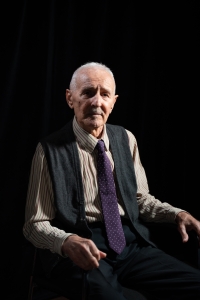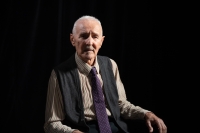„We played in front of a packed stage... so that was the biggest motivation... and that gives you something more than money!“

Stáhnout obrázek
Ján Medviď, a former Czechoslovak football player and representative, was born on August 18, 1946 in eastern Slovakia, in the picturesque village of Stročín. He comes from three siblings, the older ones being sister Jarmila and brother Michal. The roots of his family, specifically on his father Gregor‘s side, go back to Polish territory, while his grandfather Samuel transported his entire family on trailers in 1908 from a very, at that time, neglected piece of Polish land, from Kwiatoń, to the already mentioned village of Stročín. Mother Helena, unmarried Kizáková, was a native and came from four sisters. Ján‘s father Gregor inherited a considerable property from his grandfather, specifically eight and a half hectares of land and part of the forest. At the beginning of the 1950s, it could mean only one thing, and that was to be called a kulag. Which led to persecution, arrests and even imprisonment. As a small boy, Ján had to help a lot at home, be it around the household or the farmstead. However, he was definitely not unhappy, as he could also devote himself to his favorite sport, football. However, it cannot be a question of a modern field or changing rooms. He started kicking with his peers on a field marked with pegs, and as he says, he grew up in the so-called „cow academy“. He started attending elementary school in 1952 and after eight years he continued at the Middle School of Construction in Prešov. There he started his active football career, in Tatran Prešov. As it became increasingly difficult to breathe in Prešov, the atmosphere froze and jealousy among teammates also appeared, Ján decided in May 1965 to leave for Bratislava. He became a part of Slovan, and also of the Czechoslovak league. In May 1968, Ján started working in Dukla, Banská Bystrica, where he spent his mandatory military service, and where he was also caught up in the invasion of Czechoslovakia by the troops of the Warsaw Pact. After his return, in 1970 he started playing for Slovan again, until 1979. He spent his best football years there and traveled the world with 15 stops. Ján has worked in the national team since 1972. Thanks to this, he got to countries such as Marakana and Jakarta. After the mandatory military service, Ján also started studying. He studied remotely at the Faculty of Law, and later decided to study at the FTVŠ, coaching. After 1979, he accepted the position of playing coach in the Austrian team in Sandorf. In 1986, he decided to leave Czechoslovakia and became a football coach in Kuwait for seven long years. Because of the Iraqi invasion, he did not return to Kuwait, and with a one-year break, until 2010, he worked alternately in Saudi Arabia, the Emirates and Qatar. Currently, Ján is blessed with four grandchildren and is enjoying life in retirement.

